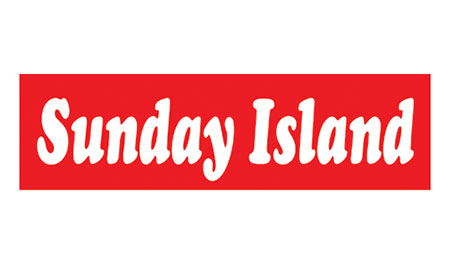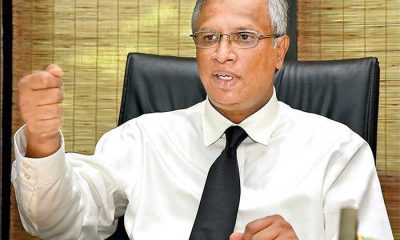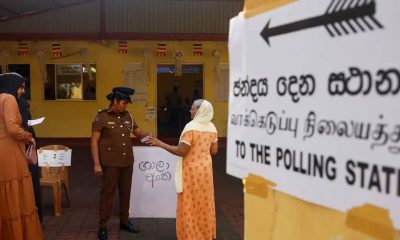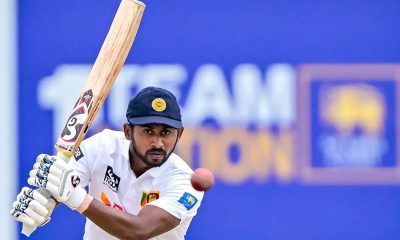Editorial
A notable anniversary

October marks the 40th anniversary of the Sunday Island and we celebrate this occasion today by publishing two articles, one by the first editor of this paper, Vijita Yapa, and the other, a condensed translation of another that appeared in the Irida Divayina last week. Upali Wijewardene who founded Upali Newspapers Ltd. (UNL), was a nephew of D.R. Wijewardene, the Beaverbrook of Sri Lanka, whose Associated Newspapers of Ceylon Ltd. (ANCL), best known as Lake House, publishing in English, Sinhalese and Tamil, played a significant role in winning Independence from the British; this not by bloodshed but through negotiations. Unlike India, we had no Mahatma Gandhi, nor did we go through as protracted a struggle as in the neighbouring subcontinent to win our freedom. The stakes, of course were different. Though ours was a green and pleasant land, second only to Japan in Asia in terms of development and lack of abject poverty, then Ceylon though not the jewel in the crown of the British Empire, was blessed with many resources including a largely literate population, a relatively sound infrastructure, an efficient public service as well as a favorable climate.
There is no doubt that Upali Wijewardene founded UNL in furtherance of his political ambitions. A nephew of not only D.R. Wijewardene, but also J.R. Jayewardene who had become Sri Lanka’s first executive president in 1977 with a stunning electoral landslide. JRJ was to later boast that this victory empowered him to do anything he wished to do ‘except make a man into a woman.’ Jayewardene handpicked Wijewardene, among the most successful enterpreneurs of his day, to head the Greater Colombo Economic Commission (GCEC) created to attract the ‘robber barons’ as he styled them to invest in Sri Lanka. Ours was a long-shackled, controlled economy that had been boldly opened by virtually a single stroke. Wijewardene had both the verve and the ability to deliver on that front, as well as an ambition to succeed his kinsman on the national throne. Once asked by the then Colombo correspondent of the Hong Kong based Far Eastern Economic Review whether he aspired to be president, he responded saying “what else is there to aspire to?” The publication of that remark infuriated Prime Minister Premadasa who too had presidential ambitions. Wijewardene sent a copy of the magazine to Premadasa with a mischievous note above the article saying “I hope you’ll enjoy this as much as I did.”
By the time UNL was founded, ANCL had been taken away from D.R. Wijewardene’s heirs by Mrs. Sirima Bandaranaike’s United Front Government which included both the Lanka Sama Samaja Party and the Ceylon Communist Party who had been implacable foes of the UNP (and of Lake House) from pre-Independence days. The takeover was on the pretext of broad basing the ownership of the company which has not happened over 50 years later. Lake House remains the propaganda trumpet of whoever is government. That perhaps well served Upali Wijewardene, married to a niece of Mrs. Bandaranaike, because his strategy for his new newspaper toy included recruiting as many of the country’s top journalists he could attract by offering three or four times what they were then earning. With the ANCL takeover, he didn’t have to poach talent from his cousin’s newspapers. Though he didn’t get all the people he wanted, he did get most, including Edmund Ranasinghe, who played a major role building up UNL’s Sinhala newspapers and shaping their political direction.
As last Sunday’s Irida Divayina article noted, many of the journalist that were recruited by UNL were to later become editors of other national newspapers as the news industry expanded in recent years. There were people like cartoonists WR Wijesoma, undoubtedly the country’s best since Aubrey Collette who cut his teeth at Lake House, photographer Rienzie Wijeratne and Ajith Samaranayake, a brilliant bilingual journalist who was head and shoulders above his contemporaries. There were others who are not mentioned here for reasons of space. The Irida Divayina made the point that just as much as Lake House was the mulgedera (principal home) of most of the best journalists of the time, UNL became a training ground, or a university, for others nurturing what was to become the Jatika Chinthanaya (national vision) that influenced the shaping of contemporary politics.
Despite Wijewardene’s close kinship to JRJ, he was no lapdog. What he published at times in his papers infuriated the president who once attempted to starve Upali companies of bank credit. Jayewardene also did not thwart his prime minister by allowing his nephew an opportunity to enter parliament. But he did protect Upali when Premadasa attempted to kick him out of the GCEC through a Parliamentary Select Committee. Upali Wijewardene’s life was tragically shortened when he and some companions returning in his private Lear jet to Sri Lanka from Malaysia where he had business interests, was lost somewhere over the Straits of Malacca. But UNL and its newspapers continued to soldier on and notch the present anniversary. While times have changed and the print media here, as in the broader world outside, is no longer what it was and is eclipsed by the electronic and social media, it is by no means dead. Many new entrants have come into the field with businessmen in countries like ours embarking into that space more for reasons of influence than of commerce. How Upali Wijewardene would have piloted his ship, had he been alive today, is an imponderable. His father died young and he believed that would be his lot too saying that was why he focused his later years on enjoying life.
Editorial
Trump’s comeback

Friday 8th November, 2024
Donald Trump has done the impossible. He has made a triumphant return to the White House against all odds. Even his ardent loyalists may not have expected him to secure a non-consecutive term like Grover Cleveland, when he refused to concede defeat following Joe Biden’s victory in the 2020 presidential election, which, he claimed, had been stolen, and went on to instigate his backers to rebel. His opponents said he had cooked his goose.
Trump, impeached twice, incurred much public opprobrium after his defeat. It was widely thought that his felony conviction in May would seal his fate as a presidential candidate. But nothing could stop him—not even an assassin’s bullet. He has been elected to the White House as a convicted felon! His sentencing is scheduled for 26 Nov., but it is very likely to be delayed either indefinitely or for four years. Other criminal cases against him will be closed. Thus, if he had not been able to re-enter the White House, he would have had to go to prison!
World leaders are falling over themselves to congratulate President elect Trump. They are saying nice things about him fawningly. The irony of President Anura Kumara Dissanayake congratulating Trump may not have been lost on keen political observers. Trump supporters marched on the US Capitol in 2021, and the following year a mob led by Dissanayake’s party, the JVP, tried to capture the parliament of Sri Lanka, albeit in vain. Both instances of rioting amounted to attacks on democracy and the rule of law, but Dissanayake and Trump have been elevated to the highest positions in their countries!
Trump’s second term is very likely to upend many US policies. Speculation is rife that he will order the deportation of immigrants, introduce import restrictions through tariff hikes, and deep-six key climate-related regulations. He is also expected to give the US education and health systems a radical shake-up. Protectionist trade policies of Trump, and his actions to create more jobs for Americans in the US itself are bound to adversely impact other economies. This is something the Sri Lankan leaders should take cognisance of; they would do better to have contingency plans ready in case of what is feared coming to pass.
Trump’s promise in his victory speech that there will be no wars for four years under his presidency must have struck a responsive chord with all peace lovers across the globe. If there is anything genuine about Trump, it is his commitment to creating a world without wars. However, the Washington-based hawks that thrive on the arms industry powered by the blood and tears of hapless victims of armed conflicts will not take kindly to his anti-war crusade. Whether the 47th POTUS will be able to prevail over the merchants of death remains to be seen.
Resolving the escalating Middle East conflict will be one of the biggest challenges for Trump. He says he will adopt a different approach to conflict resolution. President Joe Biden has the blood of Palestinians on his hands; the Democrats are thought to have a soft corner for Palestinians, but the Biden administration has been extremely generous in providing military assistance to Israel, which is destroying Palestinian lives. The Democrats find themselves in a contradiction. So do the Republicans, who are openly supportive of Israel. Trump is a true friend of the Jewish state, but he will not support wars. So, the Trump win could prove disadvantageous to the Netanyahu government, whose belligerence knows no bounds.
If it is peace in the Middle East that Trump seeks, he will be left with no alternative but to have a come-to-Jesus talk with Netanyahu, who is determined to reduce the entire Gaza strip to rubble and has apparently bitten off more than he can chew by opening several fronts. He will also have to pressure outfits such as Hamas and Hezbollah to agree to a peaceful solution.
Trump makes no bones about his antipathy towards NATO, which he has called a huge drain on US resources. He is likely to push for a ceasefire in Ukraine, but where to draw a line of control is going to be a big problem because Russians have captured swathes of land in Ukraine. The Ukraine invasion has not gone the way Vladimir Putin expected, and there is no way Volodymyr Zelensky can defeat Russia in spite of being backed by NATO. So, chances are that Trump will succeed in having the two sides agree to a ceasefire, which is the need of the hour.
Whether the world, or at least the US, will be a better place during Trump’s second term, one may not know, but his presidency surely won’t be worse than Biden’s. One can only keep one’s fingers crossed.
Editorial
Euphoria, realpolitik and reality

Thursday 7th November, 2024
The NPP’s victory in the September presidential election has catapulted the JVP to the limelight. An otherwise camera-shy JVP General Secretary, Tilvin Silva, faced an interview on the state-owned ITN on Tuesday night. What he came out with was usual campaign rhetoric, but there were some takeaways.
Silva said the JVP-led NPP had succeeded in exposing its opponents’ propaganda lies. The SLPP, the UNP, the SJB, etc., had predicted a collapse of the economy and Sri Lanka’s international isolation in the event of an NPP win in the presidential contest, but the economy was doing well; the IMF programme was on track, and some powerful nations had assured President Anura Kumara Dissanayake’ interim government of assistance, he said. China was so pleased with the JVP-NPP government’s commitment to good governance that it had decided to donate school uniform fabric to all students, he claimed.
China has no doubt helped this country in numerous ways. But wasn’t the JVP among the political parties that faulted China of having granted loans for the Rajapaksas’ mega infrastructural projects riddled with corruption?
Silva also said the US, impressed by the JVP-NPP government’s anti-corruption campaign, had offered to help attract American investors. Whoever would have thought, a few years ago, that the JVP would ever consider it an achievement to be in the good books of the US? And, why has the US done a volte-face on its better-dead-than-red policy to help the NPP led by the Marxist JVP?
The JVP, or any other party for that matter, would do well to be wary of the envoys of powerful nations bearing gifts. The big powers have neither aversion to corruption nor any love for democracy and good governance. They back foreign governments which, in their estimation, can be used to further their geo-strategic interests regardless of whether the latter are corrupt. The US had no qualms about defending Marcos of the Philippines, Shah of Iran, Papa Doc and Baby Doc of Haiti and countless other corrupt dictators across the globe to promote its own interests.
Moreover, the Americans have re-elected Donald Trump as their 47th President despite multiple court cases—both civil and criminal—against him, and his felony conviction with sentencing due soon.
The JVP/NPP should be cautious instead of being euphoric when the US showers praise on its government and offers help. It is popularly said that gift horses should not be looked in the mouth, but they must be looked in the belly. If the Trojans had been wise enough to do so during their legendary war with the Greeks, Troy would have been safe. It will be prudent for the JVP/NPP leaders to figure out what the US expects in return for its support. Altruism is no driver of foreign relations in the modern world.
President Gotabaya Rajapaksa refused to sign a Status of Forces Agreement which, if inked, would have allowed US troops to be stationed in Sri Lanka. During the 2022 uprising here, the US cranked up pressure on Gotabaya not to use force against the protesters who were all out to oust him. However, it looked the other way, when his successor, Ranil Wickremesinghe, had the Galle Face protest or Aragalaya crushed. In March 2024, the then Speaker Mahinda Yapa Abeywardena revealed in Parliament that some foreign powers had pressured him to take over the executive presidency and form a government in violation of the Constitution after the resignation of President Rajapaksa. Former Bangladeshi Prime Minister Sheikh Hasina has reportedly alleged that Washington played a role in her ouster because she refused to cede control of St. Martin’s island to the US.
Perhaps, it was India that helped further the NPP’s political interests more than any other country. A lot of legitimacy accrued to the JVP/NPP from Dissanayake’s India visit, so much so that the JVP denied ever having conducted a lecture on Indian expansionism as part of its initiation programme in the late 1980s. Diplomacy is never devoid of realpolitik, and the true nature of India’s relations with the JVP/NPP will be known only when the latter reveals its position on key issues concerning the 13th Amendment, the plunder by Indian fishers of Sri Lanka’s fishing resources, and Adani Group’s proposed power projects here.
Silva said in the aforesaid interview that during the Gotabaya Rajapaksa government, the then Minister Nimal Siripala de Silva had been compelled to resign from the Cabinet following a complaint by a Japanese envoy that he had sought kickbacks from a Japanese company engaged in a BIA expansion project, but President Ranil Wickremesinghe had reappointed him. This is a very serious allegation, which has not been probed properly though it has been repeated umpteen times. Will the JVP-NPP order a fresh probe into it?
Editorial
CPC skirts main issue

Wednesday 6th November, 2024
The Ceylon Petroleum Corporation (CPC) has leapt to the defence of the JVP/NPP government, which is under fire for the latest fuel price revision. Only the prices of Octane 95 petrol and Super Diesel have been reduced much to the resentment of the ordinary people who use Octane 92 petrol and Auto Diesel.
CPC Chairman D. A. Rajakarauna has told the media that the CPC is no longer free to determine petroleum prices due to the presence of some foreign companies in the fuel retail market, where the current fuel pricing formula applies to all players alike mandatorily. The agreements Sri Lanka signed with those foreign firms under the previous dispensation have restricted the CPC’s independence; otherwise, the CPC would have been able to lower the prices of other fuel types as well, Rajakaruna has claimed.
The CPC Chairman’s argument smacks of a misrepresentation of facts about the impact of the aforesaid agreements; it is also self-defeating. His line of reasoning makes one wonder whether the JVP/NPP, which used to make ex cathedra assertions about fuel prices, which it promised to slash, was not aware of the agreements in question when it was in the Opposition. It claims to have a team of mavens, doesn’t it?
The CPC management has apparently sought to obfuscate the main issue and deflect the blame for the government’s failure to reduce fuel prices. It has chosen to leave something important unsaid about the fuel prices and the agreements under discussion; the foreign companies involved in fuel retailing will incur losses only in a situation where fuel prices are arbitrarily reduced while the petroleum taxes are kept at the existing level, the way governments did in the past for political reasons. The costs of all fuel types include government taxes. The NPP pledged to lower fuel prices by reducing petroleum taxes, didn’t it? If it had decreased the taxes, fuel prices could have been brought down through the pricing formula, and the foreign companies would not have suffered any losses.
The Opposition insists that taxes on a litre of Octane 92 petrol amount more than Rs. 150. Will the CPC panjandrums give cost breakdowns for all fuel types so that the public will know how much they pay by way of petroleum taxes? They should also publicise the controversial agreements.
There is no gainsaying that the current government or a future administration, for that matter, must not resort to anything that will stand in the way of the ongoing efforts to boost state revenue significantly. The JVP/NPP should have known better than to promise huge fuel price reductions. Some of the main causes of the current economic crisis were politically motivated tax and tariff reductions under the Gotabaya Rajapaksa government. The ongoing economic recovery programme would go pear-shaped if some of the NPP’s main election promises were implemented.
The government’s failure to carry out its pledge to reduce fuel prices substantially entails a considerable political cost, which the JVP/NPP needs like a hole in the head at this juncture. But there is hardly anything the government can do about it. The IMF has set revenue targets for Sri Lanka, and unless they are met, the next tranche of the extended fund facility will not be unlocked. Hence the need for all political parties to refrain from promising what they cannot deliver.
The NPP is not alone in having made promises that cannot be fulfilled. One wonders whether those who made them were really serious about honouring them. The SJB has also promised to renegotiate the IMF programme!
The energy sector agreements the CPC Chairman has reportedly frowned upon bolster arguments against involving foreign companies in large-scale power generation projects here. The entry of conglomerates such as Adani into the local power sector could lead to a situation where they will pursue profit maximisation ruthlessly, causing Sri Lanka to run the risk of facing the same fate as Bangladesh, which is now at the mercy of Adani Power. It will be interesting to see how the NPP and its rivals propose to tackle this issue, which is bound to affect Sri Lanka’s energy sovereignty?
-

 Business7 days ago
Business7 days agoStandard Chartered appoints Harini Jayaweera as Chief Compliance Officer
-

 News6 days ago
News6 days agoFifteen heads of Sri Lanka missions overseas urgently recalled
-

 News6 days ago
News6 days agoFive-star hotels stop serving pork products
-

 News5 days ago
News5 days agoITAK denies secret pact with NPP
-

 Features6 days ago
Features6 days agoWaiting for a Democratic Opposition
-

 Sports6 days ago
Sports6 days agoSri Lanka’s path to Lord’s
-

 Opinion5 days ago
Opinion5 days agoLawyers’ Collective calls on govt., all political parties to commit to repeal of PTA
-

 News6 days ago
News6 days agoLanka eyes default exit by December; IMF review completion after budget: CB Governor











